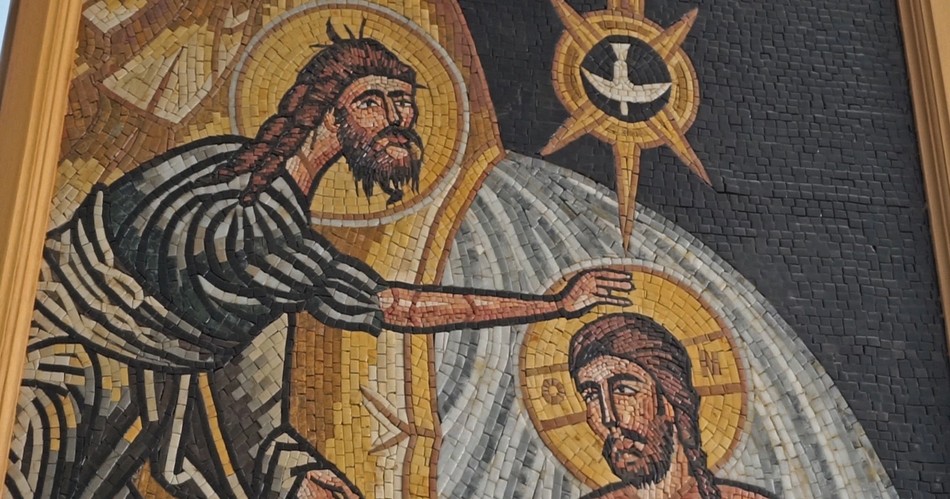John the Baptist is a prominent biblical figure whose role in the New Testament is more than just a predecessor to Jesus. His story includes prophecy, unconventional preaching, and a key role in baptizing Jesus. Let's take a journey through the Bible to uncover the story of John the Baptist and his significant influence on Christianity.
The Birth and Prophecy of John the Baptist
John's story begins with a miraculous birth to elderly parents, Zechariah and Elizabeth. The angel Gabriel foretells his birth and outlines his divine purpose. This sets the stage for John's destined role as a herald of the Messiah, emphasizing the intricate connection between prophecy and his life.
The Birth of John the Baptist Foretold: Luke 1:5-25
5 In the time of Herod king of Judea there was a priest named Zechariah, who belonged to the priestly division of Abijah; his wife Elizabeth was also a descendant of Aaron. 6 Both of them were righteous in the sight of God, observing all the Lord’s commands and decrees blamelessly. 7 But they were childless because Elizabeth was not able to conceive, and they were both very old.
8 Once when Zechariah’s division was on duty and he was serving as priest before God, 9 he was chosen by lot, according to the custom of the priesthood, to go into the temple of the Lord and burn incense. 10 And when the time for the burning of incense came, all the assembled worshipers were praying outside.
11 Then an angel of the Lord appeared to him, standing at the right side of the altar of incense. 12 When Zechariah saw him, he was startled and was gripped with fear. 13 But the angel said to him: “Do not be afraid, Zechariah; your prayer has been heard. Your wife Elizabeth will bear you a son, and you are to call him John. 14 He will be a joy and delight to you, and many will rejoice because of his birth, 15 for he will be great in the sight of the Lord. He is never to take wine or other fermented drink, and he will be filled with the Holy Spirit even before he is born. 16 He will bring back many of the people of Israel to the Lord their God. 17 And he will go on before the Lord, in the spirit and power of Elijah, to turn the hearts of the parents to their children and the disobedient to the wisdom of the righteous—to make ready a people prepared for the Lord.”
18 Zechariah asked the angel, “How can I be sure of this? I am an old man and my wife is well along in years.”
19 The angel said to him, “I am Gabriel. I stand in the presence of God, and I have been sent to speak to you and to tell you this good news. 20 And now you will be silent and not able to speak until the day this happens, because you did not believe my words, which will come true at their appointed time.”
21 Meanwhile, the people were waiting for Zechariah and wondering why he stayed so long in the temple. 22 When he came out, he could not speak to them. They realized he had seen a vision in the temple, for he kept making signs to them but remained unable to speak.
23 When his time of service was completed, he returned home. 24 After this his wife Elizabeth became pregnant and for five months remained in seclusion. 25 “The Lord has done this for me,” she said. “In these days he has shown his favor and taken away my disgrace among the people.”
The Birth of John the Baptist: Luke 1:57-66
57 When it was time for Elizabeth to have her baby, she gave birth to a son. 58 Her neighbors and relatives heard that the Lord had shown her great mercy, and they shared her joy.
59 On the eighth day they came to circumcise the child, and they were going to name him after his father Zechariah, 60 but his mother spoke up and said, “No! He is to be called John.”
61 They said to her, “There is no one among your relatives who has that name.”
62 Then they made signs to his father, to find out what he would like to name the child. 63 He asked for a writing tablet, and to everyone’s astonishment he wrote, “His name is John.” 64 Immediately his mouth was opened and his tongue set free, and he began to speak, praising God. 65 All the neighbors were filled with awe, and throughout the hill country of Judea people were talking about all these things. 66 Everyone who heard this wondered about it, asking, “What then is this child going to be?” For the Lord’s hand was with him.
Wilderness Preaching
Unlike conventional religious leaders, John chooses the wilderness as his preaching ground. His message revolves around repentance and baptism, urging people to prepare for the imminent arrival of the Messiah. This unconventional approach and profound message mark John as a distinctive figure in biblical history.
John the Baptist Prepares the Way: Matthew 3:1-6
3 In those days John the Baptist came, preaching in the wilderness of Judea 2 and saying, “Repent, for the kingdom of heaven has come near.” 3 This is he who was spoken of through the prophet Isaiah:
“A voice of one calling in the wilderness,
‘Prepare the way for the Lord,
make straight paths for him.’”
4 John’s clothes were made of camel’s hair, and he had a leather belt around his waist. His food was locusts and wild honey. 5 People went out to him from Jerusalem and all Judea and the whole region of the Jordan. 6 Confessing their sins, they were baptized by him in the Jordan River.
John Baptizes Jesus
The pinnacle of John's narrative occurs at the Jordan River, where he baptizes Jesus. This act symbolizes a transition, with John recognizing Jesus as the anticipated Messiah. The baptism becomes a profound moment, serving as a divine endorsement of Jesus' ministry.
The Baptism of Jesus
13 Then Jesus came from Galilee to the Jordan to be baptized by John. 14 But John tried to deter him, saying, “I need to be baptized by you, and do you come to me?”
15 Jesus replied, “Let it be so now; it is proper for us to do this to fulfill all righteousness.” Then John consented.
16 As soon as Jesus was baptized, he went up out of the water. At that moment heaven was opened, and he saw the Spirit of God descending like a dove and alighting on him. 17 And a voice from heaven said, “This is my Son, whom I love; with him I am well pleased.”
Conflict with Religious Authorities
John's outspoken criticism of the religious elite, the Pharisees and Sadducees, leads to his imprisonment. His steadfast commitment to truth and justice becomes a source of conflict, ultimately culminating in his execution. This episode highlights the challenging dynamics of proclaiming a counter-cultural message.
John Confronts the Pharisees and Sadducees: Matthew 3:7-12
But when he saw many of the Pharisees and Sadducees coming to where he was baptizing, he said to them: “You brood of vipers! Who warned you to flee from the coming wrath? 8 Produce fruit in keeping with repentance. 9 And do not think you can say to yourselves, ‘We have Abraham as our father.’ I tell you that out of these stones God can raise up children for Abraham. 10 The ax is already at the root of the trees, and every tree that does not produce good fruit will be cut down and thrown into the fire.
11 “I baptize you with water for repentance. But after me comes one who is more powerful than I, whose sandals I am not worthy to carry. He will baptize you with the Holy Spirit and fire. 12 His winnowing fork is in his hand, and he will clear his threshing floor, gathering his wheat into the barn and burning up the chaff with unquenchable fire.”
Influence on Jesus' Ministry
John's influence extends beyond his role as a baptizer. His life and message shape Jesus' ministry, with Jesus referring to John as more than a prophet. The intricate connection between the two figures underscores the divine orchestration of events leading to the fulfillment of prophecies.
Legacy and Recognition
Despite his tragic end, John receives recognition from Jesus, solidifying his significance in salvation history. The influence of John's teachings echoes through the development of early Christianity, emphasizing his lasting legacy.
John's unconventional lifestyle, including his diet of locusts and honey, carries symbolic significance. This peculiar choice reflects his separation from worldly comforts and serves as a metaphor for spiritual nourishment.
Religious Feasts and Commemorations
Christianity honors John the Baptist through various feasts and commemorations. These celebrations serve as a way for believers to reflect on his life, teachings, and his unique connection to the life of Jesus.
John's final proclamation, recognizing Jesus as the Lamb of God, holds profound theological significance. This declaration not only marks the culmination of his earthly mission but also contributes to the unfolding narrative of salvation.
The story of John the Baptist transcends its historical context, offering timeless lessons for contemporary believers. His emphasis on repentance, humility, and preparation remains relevant, urging individuals to reflect on their spiritual journey.
FAQs About John the Baptist
Was John the Baptist related to Jesus?
Yes, according to biblical accounts, John and Jesus were cousins. John's mother, Elizabeth, and Jesus' mother, Mary, were relatives.
Why did John baptize with water?
John's baptism with water symbolized repentance and preparedness for the coming Messiah. It was a ritual cleansing, emphasizing spiritual renewal.
What is the significance of John eating locusts and honey?
John's diet of locusts and honey symbolized his ascetic lifestyle, emphasizing his separation from worldly pleasures and his focus on spiritual nourishment.
How did John the Baptist die?
John was executed by beheading, a result of his criticism of King Herod's marriage to Herodias. Read more on the Death of John the Baptist.
Why is John the Baptist considered a precursor to Jesus?
John's role as a forerunner is emphasized in biblical prophecies, and his baptism of Jesus symbolizes the transition from the old covenant to the new, marking the beginning of Jesus' public ministry.
Photo: Getty Images/oratai jitsatsue
Christianity.com's editorial staff is a team of writers with a background in the Christian faith and writing experience. We work to create relevant, inspiring content for our audience and update timely articles as necessary.









